#lou wilson DOES NOT FUCK AROUND
Text

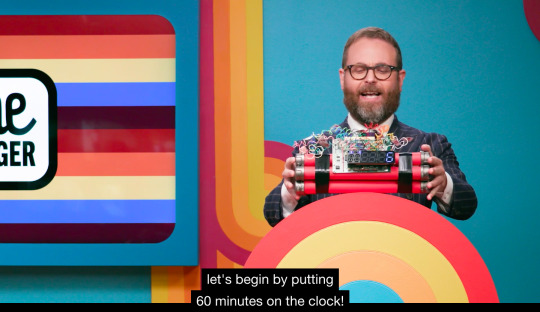
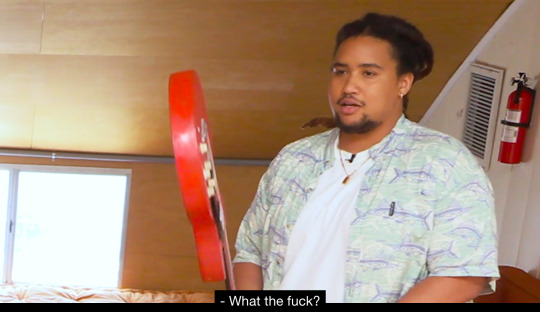
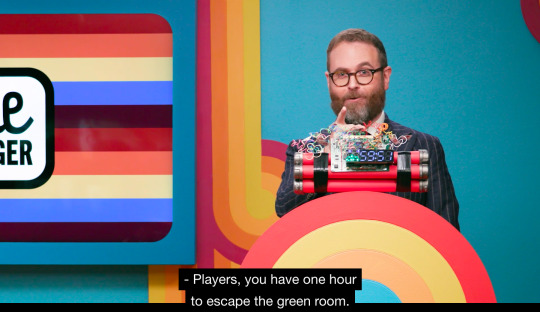


so this episode is off to a smashing start
#pun FULLY intended#holy shit the chaotic energy is absolutely top notch#lou wasted NO TIME#i love this fucking show#i have said it before and i will say it again#lou wilson DOES NOT FUCK AROUND#game changer#d20#dimension 20#college humor#dropout#dropout tv#siobhan thompson#lou wilson#brennan lee mulligan#game changer spoilers#sam reich#andis thought geyser
17K notes
·
View notes
Note
Favourite PCs from dimension 20?
OKAY LEMME DIG DEEP
For simplicity I'll go with one per season just so I don't end up writing whole essays on everyone in the entire show
Fantasy High -
Figueroth Faeth - god I love Fig so much, the way she goes from angsty bad girl teen who's acting out and trying too hard bc she feels scorned by her circumstances and the fact that her life was upended by The Sudden Realisation Of Her Infernal Heritage to legitimately caring and introspective friend who works to better how she presents herself to those around her is one of my favourite parts of Fantasy High + Figayda owns my entire soul (bonus shoutout to Figaydadaine bc I thought about it the other week and Adaine having to come to grips with realising that what she feels when Fig and Ayda kiss or something is, in fact, not only jealousy but jealousy TWICE is very good and compelling and I just think that Adaine Abernant is an ace lesbian)
Escape from the Bloodkeep -
Leiland - YES I'm a lesbian YES I'm a Matt Mercer simp we exist, the way he plays Leiland in Bloodkeep is so well done and I love the concept of someone so devoted that it blinds them to their true worth and they end up defining themself by how useful they are to the subject of their devotion, so much so that it's detrimental to their own mental health. Until they are eventually faced with a situation where they no longer have anyone to please and have to reconcile with the fact that they have worth beyond what they mean to others and also BECAUSE they mean things to others. Also I think that he and Markus should kiss, Matt and Ify should come back to do a oneshot w Brennan that is just that I'll fund it myself
The Unsleeping City -
Sofia Lee/Bicicleta - GOD THE VERY PEAK OF CHOSEN ONE NARRATIVES. She's so fucking DRIVEN and love her so much. The scene where she chooses herself is so fucking good and i've mentioned before that I love that it happened in the same episode as Ricky's big chosen one moment bc just like I love the Pete/Kingston dichotomy I'll NEVER be over the Ricky/Sofia dichotomy of "Man chosen by those who came before him" vs "Woman chosen by no others but herself" + Monk/Warlock is a Very Good combo and Emily Axford deserves the world also. YES IM A SIMP FOR EMILY CHARACTERS IM ENTITLED TO BE. Anyway Sofia's the only one of the main cast who doesn't have any real cosmic obligation to do good in the context of those 17 episodes but she does it anyway and I love her for it
Tiny Heist -
Either Agnes or Bean - first off I love Jess Ross and Griffin McElroy in general, they're both incredibly funny and so great. Agnes' reveal of the fact that she's dying is so heartbreaking and the fact that the Heist is her last hurrah is so cool and sexy of her, we love a morally dubious facewoman. Bean is a delight, the fact that Griffin said "hell yeah" one time and then it became the Watermelon Dojo's motto?? Incredible. He also leads to some of the most resourceful and fun moments in the show just bc of having such WACK Monk abilities in a heist setting which is SO GOOD. I might be misremembering things bc I truthfully have only watched TH once but y'know
A Crown of Candy -
AMETHAR. FUCKING AMETHAR.
He's so fucking good and Lou plays him so perfectly and just,,, the way he talks about his experiences playing Amethar in AP is so interesting to listen to bc you can ABSOLUTELY feel the imperfect dad mindset shining through his performance. The way he's the king who never wanted to be king, the way he's a father who's trying to do what's right by not only his daughters and his family, but his kingdom as well, even if he sometimes doesn't know what that is. I'll never forget the heartbreak I felt as Brennan was playing out the excommunication scene and you can see and hear Lou's pained "No"s as he goes on and.......I love Lou Wilson and I love Amethar so fucking much,,,,, truly if push had come to shove and he'd actually died sacrificing himself to stop his daughters from killing each other, I don't think I'd have ever recovered. There's something about parents who sincerely try their best but never really succeed to the fullest that get to me real hard
I haven't seen Pirates of Leviathan yet bc I was waiting for it to all come out before watching it but I anticipate I'll probably love Jack, Bob or Myrtle (leaning toward Myrtle bc aah hot monster lady.......)
#asks#anon#dimension 20#d20#fantasy high#the unsleeping city#a crown of candy#escape from the bloodkeep#tiny heist
42 notes
·
View notes
Photo
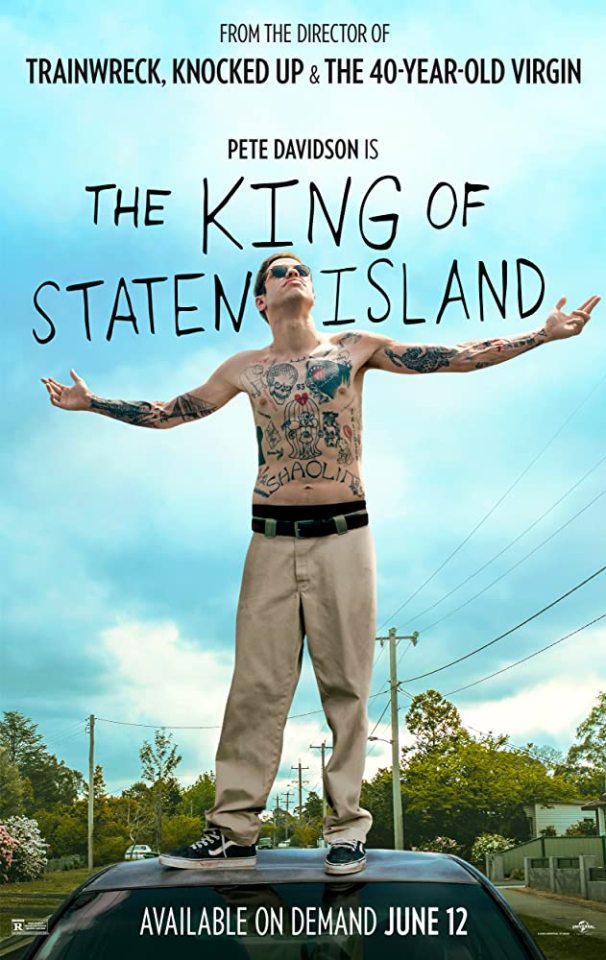
THE KING OF STATEN ISLAND (2020)
Starring Pete Davidson, Marisa Tomei, Bill Burr, Bel Powley, Ricky Velez, Lou Wilson, Moises Arias, Maude Apatow, Carly Aquilino, Robert Vidal III, Angus Costello, Pauline Chalamet, Lynne Koplitz, Joseph Paul Kennedy, Nina Hellman, Jack Hamblin, Kevin Corrigan, Stephen Davidson, Keith Robinson, Giselle King, Pamela Adlon, Domenick Lombardozzi, Colson Baker and Steve Buscemi.
Screenplay by Judd Apatow & Pete Davidson & David Sirus.
Directed by Judd Apatow.
Distributed by Universal Pictures. 116 minutes. Rated R.
As a film director, Judd Apatow seems to have a pretty set formula. Take someone who is creating a buzz in comedy – usually in stand-up, or TV, or both – but generally hasn’t broken through in film yet. Create a film loosely based on their lives and their comic personas. Make it a mixture of comedy and drama – a lot of smart wisecracks and dick jokes mixed in with some slightly melodramatic family crises. Give a supporting role to his wife and/or daughters. Have a cute little girl randomly (and somewhat unnecessarily) sing a show tune. And make the film probably about a half-hour to an hour longer than necessary.
Sometimes, this formula works out well. The Forty-Year-Old Virgin with Steve Carell and Trainwreck with Amy Schumer were both pretty great in their ways. Sometimes, it’s a mixed bag, like Knocked Up with Seth Rogen and This is 40 with Paul Rudd. Sometimes, it is nearly unbearable, like Funny People with Adam Sandler.
The King of Staten Island gives the shot to Saturday Night Live comic Pete Davidson. It is one of Apatow’s okay ones, and it may be a bit better if not for Davidson’s character, who honestly is kind of a dick through most of the film. That’s okay, of course, it’s possible to make a good comedy about a jerk, and it also makes the inevitable redemption a nicer thing, if perhaps a little unlikely.
Literally, we are introduced to Scott as he is driving on the turnpike and causes a multiple car collision because he closed his eyes while driving for a good several minutes. Of course, he makes it out unscathed, and as he drives off, not even stopping to check if everyone is okay, he listlessly says into the rearview mirror, “I’m sorry” over and over again.
Strangely, that tells you pretty much all you need to know about the guy. He’s a bit of fuck-up. He’s impulsive. He doesn’t think about consequences. He’s always apologizing after wreaking havoc in other people’s lives. Yet he never sticks around to atone, nor does he learn from his mistakes. He just lives in his mom’s house, gets stoned while playing X-Box with his friends, doesn’t work much and dreams of being a tattoo artist – though he doesn’t really have the artistic talent to make that dream a reality.
His father was a well-respected fireman who died in the line of duty when Scott was only seven. He idolizes the memory of the man, and counter-intuitively has decided he can never live up for his father’s legacy – so why even try?
His mom (Marisa Tomei) and college-bound sister (Maude Apatow) put up with him – basically prop him up – much more than he deserves, because he treats both like crap, though he obviously does love them. His female best friend since childhood (Bel Powley) is clearly in love with him, but he treats her like a booty call. His guy friends are mostly dead-end stoner punks – though in fairness, they all have surprising levels of empathy and insight at different points in the film.
His sister describes Scott as looking like “a crack dealer under the bridge,” and she’s not completely wrong. This dude is just crying out for a lifestyle makeover.
It comes, not surprisingly, through one of his clueless and reckless mistakes. He offers to tattoo a nine-year-old boy he meets in the park – not even imagining that maybe a little kid isn’t ready to make that kind of decision – and the kid chickens out after just a single line. The kid’s dad Ray (Bill Burr) is unsurprisingly pissed off and comes to his house to tell him off. It turns out the dude is also a firefighter who slightly knew Scott’s dad and falls for Scott’s mom.
Ray and mom start to date. He tries to do a bit of tough love friendship and introduce Scott to the fireman’s life, even though Ray has his own problems. Scott irrationally finds his mom’s relationship with Ray – her first romantic relationship in the 17 years since his father’s death – a stark betrayal to his dad’s memory.
Interestingly, for a change, it is the later scenes, when the guy is finding himself and starting to become a more caring, motivated man is where this movie comes to life. In general, that is where Apatow’s films fall apart, so that’s a good thing. We want to see this guy get his shit together.
However, honestly, he is probably the least interesting or likable character here. I’d have been much more interested in less of him and seeing the fleshing out of his mom’s story, or his sister’s, or his sorta girlfriend, or the head of the firehouse (played by an underused Steve Buscemi). A little bit of Pete Davidson goes a long way.
Jay S. Jacobs
Copyright ©2020 PopEntertainment.com. All rights reserved. Posted: August 25, 2020.
17 notes
·
View notes
Text
Fargo: Top 10 Characters
Television shows like Breaking Bad, The Sopranos and The Wire are definitely three of the greatest in the genre of non-fantasy dramas, thrillers, and crime fiction. If you love those three shows, but you are unfamiliar with Fargo, stop whatever you are doing, and watch it now. Right now. Thank me later.
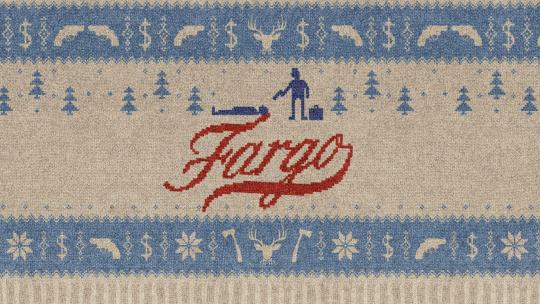
One of the reasons why Fargo is a work of genius is the intensity and depth of its characters. These characters, in my opinion, have earned the right to be categorized alongside Walter White, Tony Soprano, Omar Little and Don Draper, as some of the legendary TV characters of all time. This blog takes a look at eleven of the most astonishing characters Fargo has provided to the world of television.
Beware of spoilers, obviously.
Consolation Prize: Lester Nygaard (Season 1)
“Old Lester, now, he would've just let it slide. But not this guy.”
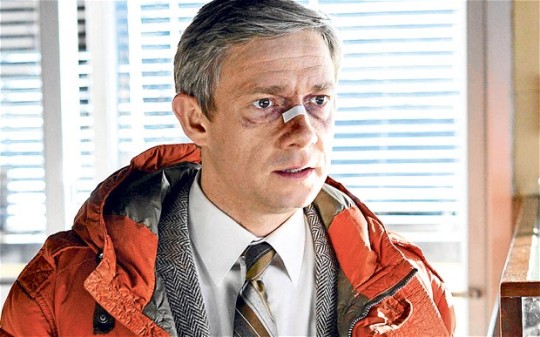
Played by Martin Freeman, or better known as Dr. John Watson from the twenty-first-century version of Sherlock Holmes, Lester Nygaard is a loser. Like all losers, we tend to feel bad for him, until his personality develops in a way which makes us abandon our pity for him. Pity is replaced by disgust, and sadness is replaced by anger. Lester’s transformation from a good-for-nothing non-achiever to a devious and heartless criminal and fugitive is definitely one of the most subtle character developments I’ve seen on TV. His role is often overshadowed by two other characters from the same season. Very important character nonetheless, brilliantly portrayed by Freeman.
10. Wes Wrench/Mr. Wrench (Season 1, Season 3)
“ “

Played by the deaf, yet brilliant actor - Russel Harvard - Mr. Wrench also can’t hear. What can do is kill. He is an assassin, and he is loyal and lethal. He appears in the first season as one-half of the committed team of Mr. Wrench and Mr. Numbers (Grady Numbers). Wrench’s childish attitude is quick to win the hearts of the audience, while his kill skills and will-power earn him a spot on this list. After losing his partner (Mr. Numbers) in a gunfight, he is spared by his partner’s killer because the killer was himself impressed by Wrench’s skills and character. He reappears in season three as an invaluable accomplice to another character on this list, a role which makes us love him even more.
9. Molly Solverson (Season 1)
“Got to love a man who keeps his word, right?“

Played by Allison Tolman, Molly is the walking-definition of a young and hungry-for-justice police officer. A daughter to a police officer and a granddaughter to a sheriff, Molly is the character that makes us nurture the hope that there is hope for goodness and justice. After losing her murdered chief early on in the show, who is replaced by an incompetent one, Molly takes up the challenge of solving her chief’s murder all by herself, and she quickly finds herself trapped in a world of assassins and conspiracies. But despite being shot and hospitalized, she just does not give in, acting as the top cop that she isn’t. The character even earned Tolman the Emmy and Golden Globe nominations.
8. V.M. Varga (Season 3)
“The past is unpredictable.”

Played by David Thewlis, or as we know him - Professor Remus ‘Mooney’ Lupin - from the Harry Potter world, Varga is sick, and in all likelihood he will make you sick to the stomach. Sadistic and ruthless, with a portrait of Joseph Stalin on his desk, Varga uses a businessman hitherto leading a happy and normal life to further his money laundering scheme. Intimidation and disposal seem to be his key tactics to success, apparent when he makes the businessman’s subordinate drink his own urine as a punishment for acting suspiciously. With the worst teeth on the show, and probably suffering from bulimia, Thewlis’ villainous role does not allow us to take even a one minute break between episodes.
7. Floyd Gerhardt (Season 2)
“Three times, I sent men to do a job. Three times, they come back unfinished. I'll handle this myself.”
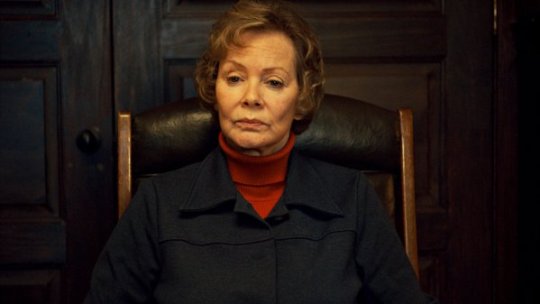
Played by Jean Smart, Floyd Gerhardt inherited one of the most difficult jobs in the world. After her husband Otto, the head of the Gerhardt crime syndicate, suffers a stroke and is unable to lead the mafia any longer, Floyd takes over all the guns and the money. Her eldest boy, Dodd, is unwilling to accept a woman, who is also old, as the new mafia don. However, throughout the season, Floyd shows us who’s boss as she uses an iron hand to deal with a rival gang from Kansas City and to investigate the homicide of her youngest son. One of the characteristics of Floyd which makes us like her so much is her love and concern for her granddaughter, who is mostly abused and humiliated by her father Dodd. The characters in season 2 are the strongest, but without Floyd, none of the other characters would be as appealing as they are.
6. Gloria Burgle (Season 3)
“There’s violence to knowing the world isn't what you thought.”
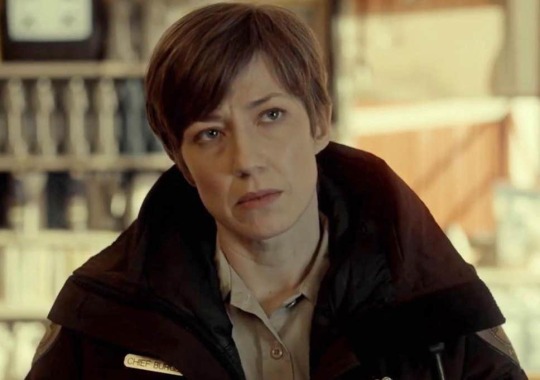
Played by Carrie Coon, Gloria is the older version of Molly Solverson. After finding her stepdad murdered via asphyxiation, Gloria’s investigation leads to bizarre outcomes that find her entwined in something very big and very dangerous. A recently divorced woman, whose position of Chief also got taken away, her new Chief is simply intolerable, who demands of her to let go of the investigation. But like Molly, she just doesn’t give up, and her relentless pursuit constitutes the heart of the third season. Gloria is an example of how some police officers simply cannot be intimidated or corrupted into submission. The final scene of Fargo is a conversation between Varga and Gloria, and arguably, that tense scene is one of the best dialogue exchanges in the series. A true superhero.
5. Lou Solverson (Season 2)
“Am I the only one here who’s clear on the concept of law enforcement?”

A loving father, a caring husband and the hotshot cop of town, Lou Solverson, played by Patrick Wilson, is your Marvel/DC superhero. Lou actually made his first appearance in the first season, as Molly’s father - former cop currently running a diner. In the second season, we are given a glimpse of Lou’s glory days as he single-handedly takes on both the Gerhardt Family and the Kansas City Mafia. Two things to note about Lou’s character - fearlessness and morality. Lou just does not submit to intimidation, as is seen in his confrontations with Mike Milligan on one occasion and with the Gerhardt Family on another. On the latter aspect, Lou is forced to take in his long-time friend Ed Blumquist on charges of murder, but the element of friendship does not deter Lou to do what he knows is his duty and is morally right.
4. Mike Milligan (Season 2)
“If the goal is to kill those who oppress you, what does it matter who goes first?”
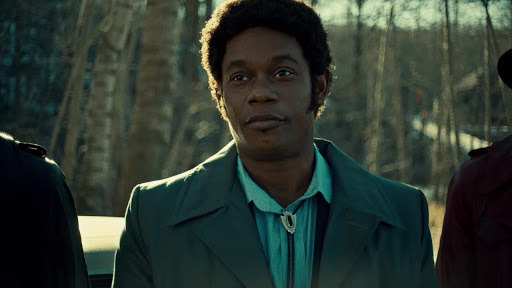
Played by Bokeem Woodbine, Mike Milligan is the epitome of suave. A well-read man, who often uses poetic quotes out of nowhere to dramatize his point, Mike is an assassin working for the Kansas City Mafia, and is in charge of ripping the Gerhardt Family apart. Arguably the most cunning and nefarious character of the second season, what sets Mike apart from other villains is the unbelievable aura of calm he brings to a seemingly tense situation. Varga does that too, but Mike does it better. Intelligence is his most lethal weapon, as his loyal henchmen, known as The Kitchen Brothers, carry out most of the bloodshed for him. At the end, although Mike meets a fate worse than death, most of us would die to be him during a gang-war.
3. Lorne Malvo (Season 1)
“There are no saints in the animal kingdom. Only breakfast and dinner.”

Played by the former husband of Angelina Jolie, Billy Bob Thornton’s portrayal of Lorne Malvo goes down as the greatest villainous role in Fargo. Malvo, in simple words, is pure evil. He does not care. He is a predator, with an ideology best put as, “kill or be killed”. He begins an unusual friendship with the Lester Nygaard, whose character is antithetical to that of Malvo. He even saves Lester from arrest and gradually, through his venomous words, turns him from an innocent loser into a evil loser. Eventually, Lester tries to show him who’s boss, realizing he couldn’t have made a worse choice about who to fuck around with. The personification of evil that is Malvo, can be categorized with characters such an Anton Chigurh, the Joker and Hans Gruber (who has an unusual physical resemblance with Malvo) on the list of the greatest villains of all time.
2. Ohanzee “Hanzee” Dent (Season 2)
“ “Send the Indian,” they'd say. “Who cares about booby traps? Give Hanzee a flashlight and a knife and send him down into the black echo.” ”
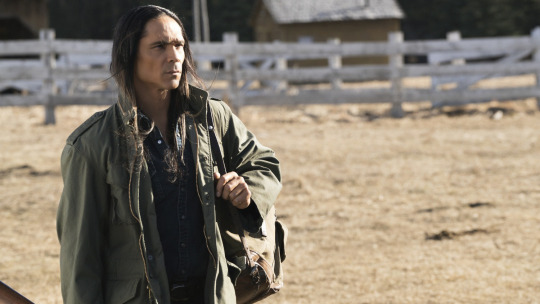
Played by Zahn McClarnon, Hanzee Dent is not an evil guy. He is a bad man, sure. But he is not EVIL. He is not a villain. Society alienated him, treated him like a mongrel and made him a ticking time-bomb only seconds away from the boom. A native-american assassin recruited by Otto Gerhardt from a very young age, Hanzee appears to be a loyal hit-man for the Gerhardt Family, until he loses his shit. An unstoppable force and a ruthless killer with a history of military service (Vietnam), Hanzee has an agenda of his own. His killing spree is triggered by a sign outside a pub boasting about murders of 22 Sioux Indians who were hung there, with a puddle of dried vomit beneath it. Arguably the most complicated character of the show, with an intense development of personality, Hanzee Dent is the only character in the show who is a lethal assassin but makes us pity him and root for him.
One Last Consolation Prize: Peggy Blumquist (Season 2)
“I just wanted to be someone.”

Played by Kirsten Dunst, or Mary Jane from the Tobey Maguire Spiderman series, Peggy Blumquist is the source of all the drama. After she accidentally runs over the youngest Gerhardt son, Rye Gerhardt, her husband, Ed Blumquist (another brilliant character) becomes number one on the Gerhardt Family’s blacklist, and acquires the nickname - The Butcher of Luverne. Peggy should not be perceived as stupid or a trouble-maker. Throughout the show, she feels what many of us also feel, that we are not living up to our potential. Her interests conflict with her husband’s interests, but eventually she does everything in her capacity to clean up the mess that she (unintentionally) created, and to save her husband from the cops and the mafia. Her portrayal by Dunst was vastly appreciated by critics and fans alike, but in a show comprising of so many awesome characters, it was impossible for me to include Peggy in my top ten.
1. Nikki Swango (Season 3)
“You've made me the happiest woman ever. Now, let's make a sex tape.”

In Fargo, we have super-heroes, heroes, villains and super-villains, and we have Nikki Swango, portrayed by Mary Elizabeth Winstead. Right from the moment we saw her eliminate a threat to her grand plan with the help an air-conditioner, Nikki provided Fargo with the most unique ‘unique character’. A genius who utilizes her intellect in a professional game of cards (Bridge), she may be, at first, perceived as selfish and shallow. But towards the end, it is evident that she actually did love her fiance Ray Stussy, and wasn’t just using him for her personal ambitions. It is hard to put a hero/villain label on her because she embodies the key characteristics of both roles - empathy, willpower, deviousness, ruthlessness and a thick skin. Her partnership with Mr. Wrench, her plan to execute the entire squad led by Varga AND extort two million dollars from him has to be one of the most memorable moments of the series. Not to forget how she, along with Wrench, hijacked the truck carrying all the documents needed by the IRS to prosecute Varga. Simply put, Nikki Swango is the badass of the show.
So that’s my list. I won’t ask you to like or comment on my blog (some feedback would be appreciated though). All I want from the world of Netflix, is that this TV show receives the viewership and appreciation that it deserves, which it hasn’t gotten yet.
20 notes
·
View notes
Photo
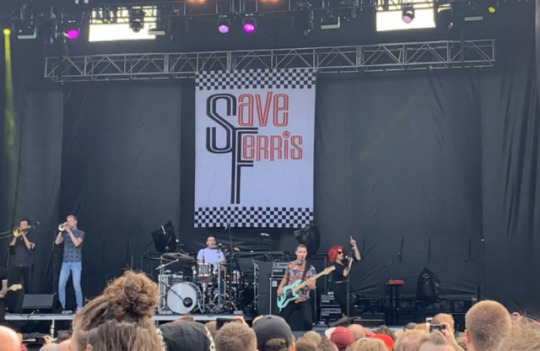
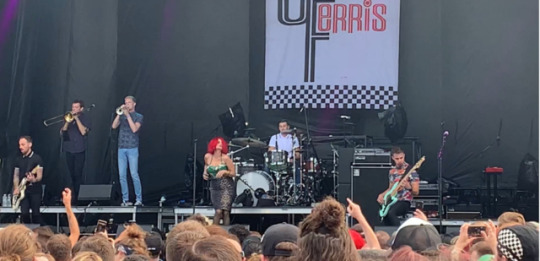

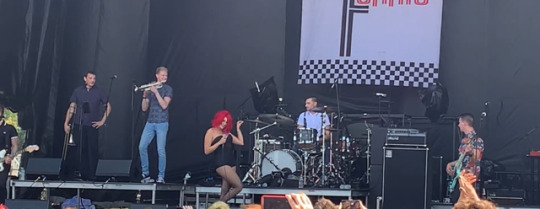
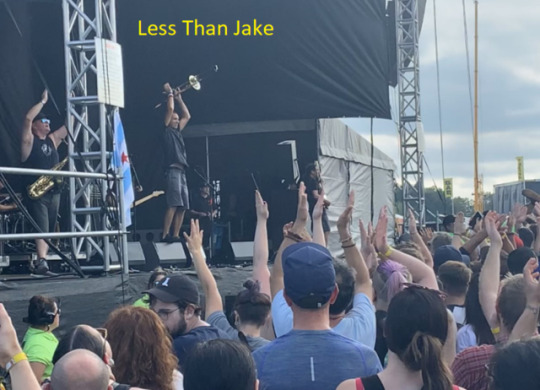
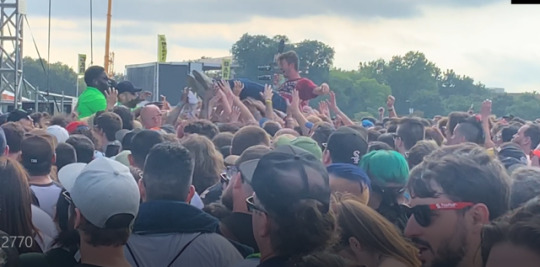


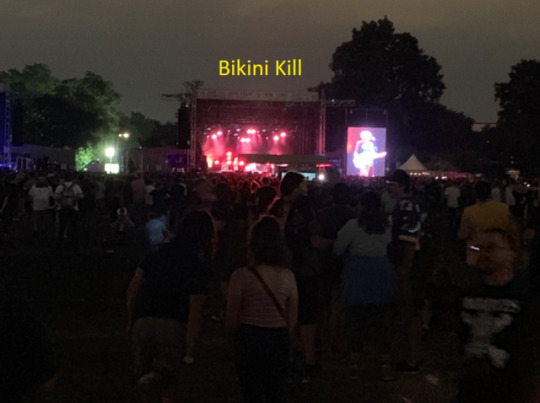
RIOT FEST, Day 3 Sunday September 15
My wife did not attend this day, but I still opted for driving as I couldn’t face taking the L after the ease of driving and parking the first two days. Weather was very similar to Friday. Some rain in the morning created a few muddy/wet areas, but the fields were mostly in good shape. A little humid with a cooling breeze and just a very light sprinkle for a few minutes later in the day.
· Ultra Q (Rise stage) – The first band of the day. I didn’t have anyone in particular I wanted to see at this time, but Ultra Q was the choice simply because they were on the stage of the next band I wanted to see. They were a rockin’ Pop Punk band and a good opener for Day 3.
· Save Ferris (Rise stage) - I have to admit this is one of the bands I most wanted to see this year. I love Ska Punk, I’m easily hooked on good Pop sounds and I’m a sucker for any band with a good front woman. Their 1997 debut It Means Everything is an album I cannot seem to get enough of. After their sophomore release Modified in 1997, they struggled through numerous personnel changes, breakups, lawsuits and eventually a revival where Monique Powell was able to obtain the rights to the band’s name. Deservedly so because she is the face of the band. And she was soooo entertaining. Her singing, humor and banter was outstanding. She held the crowd in sway in a manner that is comparable to Gwen Stefani. She started the show in a tight black dress and stripped off pieces of clothing until she was eventually down to a Vaudeville-type leotard. She strutted around the stage while teasing the crowd with sexual innuendos. Even the band members continuously laughed and smiled while watching her stage antics. The band covered the Dead Kennedys song Too Drunk To Fuck and of course, they finished the set with their great cover of Come On Eileen. Based on the energy Monique puts into singing on her records, I had high hopes for the show and she and Save Ferris did not disappoint.
· White Reaper (Roots Stage) – This Louisville band that was not on my radar. However, as I was walking through the park that morning, a lady I was chatting with suggested I see White Reaper because her cousin is in the band. They were very good playing a brand of Hard Rock/Garage Punk. I stayed for about half their set before moving on to catch some of another band.
· Frank Iero and The Future Violents (Rise Stage) – I caught the second half of this show. Frank Iero was one of the guitar players in My Chemical Romance. I was not familiar with this band but they had a nice Alternative sound and were very energetic on stage.
· Less Than Jake – Well, I had to have more Ska Punk! I remember my older son David being into this band when he was a young teenager. Although I’ve listened to this musical genre since the Ska Revival in the late 70’s, it was really David’s interest in bands like Reel Big Fish, Save Ferris, The Aquabats and Less Than Jake that got me to start listening to it on somewhat of a regular basis. Less Than Jake was awesome. I stood close to the stage and enjoyed their sound, energy and great humor. They put so much into their show and had a lot of fun with the audience. It was easy to tell by their laughter, smiles and jokes that they really enjoy what they are doing. This is a band I would definitely like to see again.
· Sincere Engineer (Rebel stage) – This band is led by Chicagoan Deanna Belos. Their debut album was just two years ago. Very good hard driving Garage Punk. This was the only band I saw with my younger son Dylan, who had just arrived and then departed after the set to catch up with friends.
· Streetlight Manifesto (Rise stage) – And more Ska! I did not see the first half of their set but Dylan and I could hear them while we sitting on the soccer field and eating some dinner. After Dylan left, I went to see the rest of their set. Like Less Than Jake, they were a fun, energetic Ska band.
· B-52’s (Radicals stage) – For my taste, this was the beginning of a killer ending for Riot Fest with an incomparable Final Four musical artists. While I can’t say that I am a huge B-52’s fan, I did get into them from hanging out with my buddy Dean in the 1980’s. Their album Comic Thing, released in June 1989, was a summer classic that year. I still enjoy listening to it from beginning to end. They played their two big hits from that album, Love Shack and my favorite, Roam in addition to other hits such as Give Me Back My Man and Rock Lobster. What amazed me was that Kate Pierson (71) and Cindy Wilson (62) still sounded youthful and superb. Fred Schneider’s quirky voice still sounds the same too with his singing and talking voices being virtually indistinguishable. They also drew the largest crowd I had ever seen at the Radicals stage. There sound was rounded out with original member Keith Strickland on guitar and a host of touring musicians. While all still the original members, the death the Ricky Wilson in 1985 almost ended the band, but they forged ahead as a quartet and continuing to be a very entertaining band. After Riot Fest, I did read an article that suggested this was a farewell tour for the band. I haven’t seen or heard that anywhere else. Given their ages and longevity, I guess it would not be surprising, but I hope they stick around awhile longer.
· Patti Smith and Her Band (Riot stage) – The second of the Final Four was the great Patti Smith. This was my second time seeing her as she was also at Riot Fest in 2014. One of the founders of Punk (before it was called Punk), she was way ahead of her time in terms of her music, attitude and feminism. While she has produced some great songs, I was surprised, though not disappointed, that she did several cover versions during her set including I’m Free (Rolling Stones), Beds Are Burning (Midnight Oil), Are You Experienced? (Jimi Hendrix), Walk On The Wild Side (Lou Reed) and After The Goldrush (Neil Young). I particularly liked I’m Free and Beds Are Burning. She closed the set with Gloria, which is technically a cover song (Them). However, that was the opening track of her first album and she did such a unique version of the song that she has made it her own. Add in People Have The Power and Because The Night along with a couple of other originals and it made for a wonderfully enjoyable set.
· The Raconteurs (Roots stage) – Earlier in the year, when I heard The Raconteurs were touring, I immediately went to their website to see when they would be in Chicago. While they were going to be playing in Midwest states during September, Chicago was noticeably absent from their schedule. That immediately led me to speculate that they would play Riot Fest. While I’m sure I wasn’t the only on to draw that conclusion, I was dead right for a change. (My Riot Fest prediction percentage does not have the best track record.) I just saw Jack White perform last year at Lollapalooza so it was great to see him again a little more than a year later. I would have to say for overall performance, this was, in my book, the best of the festival. The show was just so impactful in terms of being a tight band with great professional talent, tremendous production and a powerhouse of sound. They played six songs off the new album (Help Us Stranger), four from Broken Boy Soldiers and three form Consolers Of The Lonely. I like all three albums so I was happy with everything they played. Jack White also referenced Bikini Kill during the set and the band also played a snippet of Gloria which I interpreted as a nod to Patti Smith.Unlike last year at Lolla, Jack White did not offer much banter between songs, but I believe the bands stage time was much shorter at Riot Fest than it was at Lolla. As with last year at Lolla, I thoroughly enjoyed Jack White’s guitar playing. When you look at the span of his career, the various directions he has gone with his music, and the potential he still has, he is truly a treasure of American Rock music.
· Bikini Kill (Riot stage) – This band was Riot Mike’s coup for the 2019 edition of Riot Fest. This year was the first time Bikini Kill officially reunited as a band since they broke up in 1997. The reunion included 3 of 4 original members (Kathleen Hanna, Tobi Vail and Kathi Wilcox). I have twice seen Kathleen Hanna live with her band The Julie Ruin, but I never thought I would see Bikini Kill. It seemed like a bit of a strange transition from The Raconteurs big time Rock sound to Bikini Kill’s stripped-down Riot Grrrl sound. But Riot Fest is first and foremost a Punk Rock festival, so Bikini Kill deserved the top spot. Kathleen Hanna also commented on how difficult it is for a female band to get “this spot” (top headliner and a Rock music festival). Kathleen sang the bulk of the songs with Tobi Vail taking lead vocals for a few numbers. Kathleen talked quite a bit between songs, often addressing societal issues from a feminist point of view but also talking about the history behind some of the songs. Based on my experience seeing The Julie Ruin, I know she likes to chat on stage. However, when you are given a 75 minute time slot and you play Punk songs that are on average maybe two minutes long, I suppose you have to fill up the time with some banter. At any rate, it was fantastic to see this band and an awesome way to end Riot Fest 2019.
#riot fest#chicago#douglas park#ultra q#save ferris#white reaper#frank iero#less than jake#sincere engineer#streetlight manifesto#the b-52's#patti smith#the raconteurs#bikini kill#fuck yeah riot fest#riot fest sucks
12 notes
·
View notes
Video
youtube
LANA DEL REY - THE GREATEST
[7.71]
The discourse is lit...
Joshua Minsoo Kim: Lana Del Rey's embrace of decades-old American culture has always been a window into the present, so it's no surprise that her invocations of rock music and Dennis Wilson's deaths on "The Greatest" are signposts for our own inevitable demise. But even before she concludes the song with ruminations on California wildfires, Hawaii's false missile alert, and the possible necessity of colonizing Mars, you can sense the knowing dread in the midsong guitar solo and her affected vocalizing. She declares that she's "wasted" with poise and romantic longing, stretching the word out into a rallying cry; she intimates that debauchery is not just an expected response to contemporary anxieties, but an empowering action in times of seeming powerlessness. She channels that same depressing spirit in her semi-ironic delivery of the song's most memorable couplet -- "The culture is lit and I had a ball/I guess that I'm burned out after all" -- toying with its dual meaning to succinctly portray how escapism in end times isn't indecent behavior, but a necessary means toward survival and acceptance of one's fate. The sparse guitar strums and piano melodies that close out the song anticipate the somber eventuality that awaits us, but can that be much worse than right now? Worse than a time when "dancing with you" and "doing nothing" can be nostalgic pastimes due to never ending stress? Whatever the case, we'll collectively watch as it happens; it's the "live stream" that Lana hints at in the final line, and it'll be of cinematic proportions: "the greatest loss of them all."
[9]
Joshua Copperman: "The culture is lit, and if this is it‚ I had a ball." This line is everything I hate about the aesthetics of this decade, but it IS the aesthetic of this decade, at least the latter half. Apart from rare, usually unintentional exceptions, something about 2010s voice-of-a-generation songs always felt pat, apparently because they had hope. We need songs for an age when everything is so overwhelming and impossible that there's nothing left to do but give up, give in, and bide your time until the flames -- the literal ones or the David Foster Wallace ones -- consume you too. (Who by fire, who by water vapor.) The cool, detached gloominess of "The Greatest" sends the opposite message to the one producer Jack Antonoff sent years ago; I don't want to get better, because there's no time left and no point. Lana was "doing nothing most of all," and that's why she's become the figurehead for this decade's music. Not Gaga. Not Beyonce. Not Lorde. Lana. Lana won the race to the bottom because she was there first; maybe a writer once took her sadness out of context, yet if someone said "I wish I was dead already" today, the response would not rise beyond a shrug of 'mood.' I don't even like this song that much as a song. It's slow and dreary, and that "culture is lit" line sounds hackneyed and pandering in its own way. But it's because of that artificiality that the line feels authentic, which was Lana's whole thing in the first place. Maybe I'm just bitter that she became so important when I wasn't looking. To paraphrase another, equally 2019 line, I hate to see it. Especially when I was so blind the whole time.
[7]
Josh Buck: "I miss New York, and I Miss you. Me and my friends, we miss rock and roll." As Lana del Rey laments her Big Apple days, it feels like a lifetime since she was a Brooklyn Baby, singing Lou Reed with her boyfriend's band. She ventured out west to create an entire California fantasia and over a handful of albums, she built a cinematic version of the Golden State that was vibrant and full of endless sun and limitless romantic possibilities; even if it was all tinged with just a dab of noir-ish danger. It was a world as fully realized and teeming with mythology as a great novel. And "The Greatest" is where she watches it all burn down. "I'm facing the greatest loss of them all." California dreams are beautiful, until you have to wake up, so she sparks a cigarette and raises a glass to the ride. But if "The Greatest" is a moment of personal reflection, it's also a celebration. It's a toast to a new Greatest Generation. A generation that created and protested, that fucked and traveled and loved in spite of a planet threatening to burn them alive, and world leaders determined to end things even quicker. It's an anthem for thriving in the face of the apocalypse. It's my favorite single of 2019, and just thinking about it triggers a million competing emotions. If all somehow make it through this moment, we'll have one hell of a story, and a hell of a song to go with it. The culture is lit, but we had a ball.
[10]
Michael Hong: A couple of cycles ago, that line probably would have drawn mass scorn from critics, but for now, it may very well be the lyric of the year. Part of that may be attributed to the way the culture has shifted their view on Lana Del Rey, but another part of it is that Lana sounds the most honest she's ever sounded. "The Greatest" is an ominous but sincere reflection of the current state of the world, and Lana no longer seems content with empty depictions of American touchstones. Lines like "I miss New York and I miss the music" still rely on those same symbols, but they now feel like lived experiences rather than empty nostalgic musings. Hell, Lana Del Rey even manages not only to make "me and my friends, we miss rock 'n' roll" work but sound like one of the most profound statements you've ever heard. Lana Del Rey's hushed vocals paired with the gauzy instrumental are quietly disarming, playing out like the cinematic zoom-out at the edge of the apocalypse. And if this is it, those final laments on the outro might be the greatest way to go out.
[9]
Alfred Soto: She's not the greatest, nor does she think she's the greatest, so long as she thinks the "culture is lit" and she's "having a ball," whatever that means, but I suspect it means more than the guitar solo. Narcissism as plaint.
[7]
Katherine St Asaph: The core Lana Del Rey problem is that she confuses narcotic with dramatic and droning with sweeping. "The Greatest" mitigates those faults a little, but only a little, and only by borrowing some faults from classic rock. The track also smothers what could have been a fine torch song in overproduction -- the culture can't be lit if you snuff it out with a million moles of echo. It shouldn't happen that I felt more genuine things about ghosts and missing things from a perfume newsletter than this.
[4]
Ian Mathers: So here's the thing; I originally wrote about and scored this song before the more exhausting parts of the whole Lana Del Rey Conversation that engulfed Music Twitter last week had happened, and I was basically saying, yeah, the conversation is interesting and has some good points but I mostly receive the song outside of it and I just like that song (and generally do, with her singles). But then... it got worse. And between the artist herself showing her ass and all of the assorted takes, the thought of listening to any of LDR's music just got more and more enervating. Some would say it's unfair or incorrect to adjust my opinion of this song, or at least to admit that those events have, in fact, adjusted my opinion of the song. But I'm a guy who wrote a Master's thesis at least partly on the idea that the context around a work of art justifiably changes not only our aesthetic relationship to it but the ontological status of the work of art itself (which is not a physical thing, not even as data). The classical example is finding out, say, a painting is a forgery, but honestly this whole thing is a great example too. Doesn't make me outright dislike "The Greatest", but does legitimately move it from being a real bright spot to a song I enjoy that I need a bit of a break from.
[7]
Stephen Eisermann: Hats off to Lana and Jack for really creating an atmosphere of nostalgia that you fall into the second you hit play. Lana's vocal is tender and understated, further reinforcing the sense of longing the track aims to create; but, hearing her sing the word "lit" and the Kanye West reference stand in stark contrast to that moody guitar lick and I... I just can't reconcile the two.
[4]
Jacob Sujin Kuppermann: Lana Del Rey is deeply aware of the fickleness of the music industry. On Born to Die, that manifested in her almost-trolling approach -- aggravating, almost-rap cadences, weird production choices, even weirder lyrical ones -- that wormed its way into the pop consciousness. For her middle three albums, she refashioned herself as a thinking person's pop star, working with more respectable (and more male) figures like Dan Aurebach and A$AP Rocky as a way of positioning herself as adjacent to prestige. The music was better but also more boring. Now, with Norman Fucking Rockwell!, she has cashed all the checks that a decade of practice and following the rules of pop earn you. "The Greatest" is a thesis statement for the album's ambition. It's not just the title -- although that is a helpful indicator. It's everything: the classic rock guitars and big drum fills, the nostalgia for doing nothing of the lyrics, the way she sings them. On "The Greatest," Lana sounds done. Not exhausted, but complete, as if she could walk away from this all and not miss a second's worth of sleep. It's a big damn classic rock song that's aware of how bombastic it sounds, and yet its self-awareness does not undercut its narrative and sonic heft. It's the kind of song you can't make without making a lot of worse songs that dance around the same topics. But here, where it really counts? Lana nails it. It's a buzzer-beater of a song, rattling around the rim four times before falling in -- all the sweeter in glory for the bumps on the road before it. It's likely not the last Lana Del Rey single we'll review, but if it is, it's a fitting send-off: in response to all the fickleness of the industry, Lana rewrites her story on her own terms, and makes it sing.
[9]
Jackie Powell: Norman Fucking Rockwell started as such a fascinating paradox, but didn't really continue building and evolving on what made its first third so successful. "The Greatest" is lyrically relatable and sonically beautiful. Jack Antonoff, being the wizard that he is, finds a way to wean Lana Del Rey of her noir and whining tendencies. He overdubs her potential for a beautiful vocal pairing it with brighter arrangements. It's pellucid and mellow but not a snoozefest. But its placement on this album really sold the track short. NFR loaded its most compelling tracks at the top of the project. Del Rey placed "The Greatest" after "Fuck it I love you" in a double feature of a music video, which where it should have been placed on the album. In the visual, Del Rey floats around and almost above her surroundings contemplating what's next. The haunting but gorgeously comforting guitar solo brings the listener along with Lana herself back down to earth. Lyrically and through its soft piano, the outro is what gives this song its weight and a sense of profundity. Her cultural references which include Kanye West's physical and emotional transformation and David Bowie's "Life on Mars" allow us to reflect on what we've become. Lana Del Rey does that here and on almost every record. I just wish "The Greatest" was given the proper stage to achieve the status of its moniker.
[6]
Joshua Lu: The majority of "The Greatest" feels unbound by time, as Lana Del Rey reuses Extremely American words that apply to the '80s as much as today: Long Beach, New York, the Beach Boys, rock 'n' roll. Only the outro plants the song firmly in the current year -- with mentions of Mars, Kanye, global warming, and that time Hawaii thought it was about to get bombed -- and with this passage of time, these signifiers bring no joy to Lana anymore. Her sprawling sense of nihilism seeps through in her languid voice and the turgid, psychedelic guitar as she laments how her generation's time is ticking away. Tempting as it is, I'm wary to read into this song as some kind of political statement, in part because the epochs that Lana fetishizes were also rather shitty, and also because I think Lana herself wouldn't prefer this reading, as it would play into that "p" word she, erm, has expressed adversity to. Maybe that's the song's trap, that despite how alluring it is to try to ascribe some deeper meaning, it's better to just do what the song does: sit back, observe, and mourn.
[8]
Alex Clifton: Lana Del Rey has a beautiful and occasionally overwhelming voice. It's haunting but for me it can be like ingesting too much cake in one sitting -- extremely rich to the point where it feels exhausting to listen to more than one song at a time. Having said that, "The Greatest" is a song that works well with Del Rey's vocals. When the first pre-chorus hits -- "those nights were on fire, we couldn't get higher" -- her breathiness feels less like an affect but sadder and more wistful, the awareness that she'll never be able to get that life back again. It's a grandiose song, strings and languid piano and a chorus of a dozen Lanas sighing "if this is it, I'm signing off," but for once the grandiosity of the production fits the message. My issue with Del Rey's persona back in the Born to Die days was that I couldn't quite make out who she was under all the artifice, flower crowns and American flags. I know that's the appeal of artists like Del Rey, whose entire careers are built off of specific personas (despite what they claim to the contrary), but I don't deal well with facades that are built that tall. Arguments about personas and performativity in music can quickly dissolve into arguments about authenticity and how much that matters to the music, and I want to stress that I don't care about authenticity in the slightest -- I just like the moments where artists aren't invincible but human. In "The Greatest" those walls crumble down and Del Rey revels in her sadness in a way that hits close to the heart. She's vulnerable and mourning over a real love rather than a fantasy, and for once I feel like persona or no, I understand the appeal of Lana Del Rey.
[8]
Vikram Joseph: At 2am this morning I found myself in the smoky bedroom of a guy I hadn't met until two hours earlier, half a bottle of red wine deep and still high off the fumes of the MUNA show I'd just been to, discussing the aesthetics of Lana Del Rey's music videos (as a kind of emotional foreplay, I guess?). It struck me that this, right there, was actually a pretty good representation of Lana's aesthetic -- unlikely moments that shimmer at the fringes of reality, a doomed romanticism that bleeds into a laconic, blissful sort of nihilism. There's so much heightened emotion (close to melodrama) in her music, and yet there's a simplicity too in what she craves -- men, bars, California, sun -- that Vice described as a "revolutionary pleasure." It feels like an extremely LDR move to draw a direct parallel between lost love and the end of the actual fucking world, but it's testament to her songwriting, those aesthetics that she's worked so hard on, and the spellbinding, crystalline production on "The Greatest" that she pulls it off so completely. From the opening bars -- dignified piano chords, soft-focus acoustic guitars and cinematic strings -- it feels like an elegy; I can't help but see the crumbling, sunlit edifice of a gorgeous building when I hear this song, especially during that billowing, washed-out guitar solo, or the slow nuclear decay of the outro. "The Greatest" feels like a culmination, and a kind of closure. It's a veteran of an iconic club scene reading the memoirs of her golden years out loud, or the last time two people who once loved each other ever speak, or a beach scene at the end of civilisation. Sonically and aesthetically, it sounds cast adrift in time, and that's why it's so effective. It's the end of the world as we know it -- I don't think Lana feels fine, exactly, but maybe there's a certain comfort in finally knowing for sure that it was all for nothing.
[10]
Will Adams: Lana Del Rey made a career writing elegies to American culture, which is what makes "The Greatest" as moving as it is heartbreaking. The patriotism of "American" has turned bitter. The sprawling luxury of "Shades of Cool" has fizzled. The worries expressed in "Coachella -- Woodstock In My Mind" have been realized in twisted, terrifying ways. So it makes sense that, after a few minutes of misty-eyed farewells presented with a smile ("I had a ball"), it all collapses to rubble. The gleaming classic rock evaporates into three descending chords. This, it turns out, is the greatest loss of all. Not rock 'n' roll, not a past lover, not Long Beach, not Kanye West, but everything. In that final minute, the song sinks to the ocean floor, the flaming city fading from view, the monuments and culture blurring into nothing. Del Rey is gone, too, as there's nothing left to say. There is nothing except the brutal end.
[10]
[Read, comment and vote on The Singles Jukebox]
2 notes
·
View notes
Text
lou’s “if i add 12 to con can i eat lightbulbs?” is officially the only emotion in the world
#until he said that i hadnt even CONSIDERED#but like. lowkey my con would already be decently high#like my body sucks but i never get sick#so actually not like. High. but probably around an 11-12? maybe??#get that shit up to a 20-something and....... maybe i can FINALLY eat glass like chips#i wanna have an inhumanly high resistance to sickness and poison so i can fucking put a whole lightbulb in my mouth FINALLY#anyway lou wilson how does it feel being the funniest man on earth#d20
0 notes
Text
[OC] Jack Eichel Takes Over the Sabres (An Alternate Reality)
(Previous parts of this series include: Jim Benninging the Canucks, Mike Milburying the Islanders, Don Cherry Drafts the Leafs, Tom Wilson-Proofing the Penguins, Dundon DIYs the Hurricanes, Re-Chiarelling the Oilers, Moneyballing the Sens, Covertly Tanking the Wild, and Frenchifying the Canadiens.)Part 1It's April 17th 2015, and the Buffalo Sabres have just suffered their first unintentional loss of the season: the draft lottery. GM Tim Murray thought that he and Connor McDavid would form the backbone of a new era for the Sabres - now all they have in common is that both of them are trying not to cry on national television. The consolation prize is Jack Eichel, a Boston University product who miles away is pounding down Sam Adamses and declaring "Buffalo... I'm coming for ya!" while privately wondering where exactly Buffalo is. When asked by the Sportsnet host how he feels about picking Eichel at #2, Murray blurts out "I'm disappointed for our fans."Flash forward to the draft itself. After two months of utter depression, Murray finally meets the #2 ranked prospect at a pre-draft interview featuring scouts, the coaching staff, and members of ownership. While they all seem very taken with the kid, Murray can't help but notice that Eichel refuses to make eye contact with him, speaking directly to owner Terry Pegula instead. But prospects are weird sometimes, and there are trades to focus on. He completes one with Colorado that afternoon to bring in Ryan O'Reilly, who will be the perfect #2 centre behind Conno- sorry, Jack Eichel - and acquires a number 1 goalie in Robin Lehner. He almost acquires the 16th pick in the draft, but Peter Chiarelli demands Zemgus Girgensons, and you can't trade away an all-star like him for pennies on the dollar.When Murray blankly calls Eichel's name on the draft stage that night, the young player looks at the sweater handed to him and says "where's the captain's 'C'?" Murray laughs, but Eichel does not. Once they get off the stage, the GM doesn't see Eichel for the rest of the night.Part 2Tim Murray arrives at his office a few days later to prepare for unrestricted free agency and is shocked to see it completely redesigned, covered in Boston University paraphernalia and pornographic posters. Leaning back with his feet on the GM's desk is the rookie, framed by the towering Buffalo skyline out the window behind him and chugging a tall can of Miller Lite."Jack, what the hell have you done to my office?""Your office? This is my office bud." The phone rings. "Hold on a moment."Murray sputters as Eichel picks up the phone. It's Avalanche GM Joe Sakic - Murray had inquired about a potential swap the night before."Hey. No, this isn't Mr. Murray, that bender's history. It's Jack Eichel. Yeah, I'm in charge now, what of it? The fuck did you just say to me? You wanna go bud? Don't call this number again you fuckin' turkey" Eichel yells, and slams the phone down. Murray gapes at him in horror.His secretary calls over from the reception area. "Sir, there's a call coming in from Brett Hull.""Who the hell is that?" Eichel asks. "Put him through I guess.""This is Brett Hull. If you talk to Mr. Sakic that way again I'll stick my foot in your crease.""Hang on bud, I know who you are! You were fuckin' useless in NHL 06, get the hell outta here."As he hangs up, Terry Pegula walks in. "Hey Jack, how are you settling in?"Murray interrupts "What the hell's going on here Terry? I just got here and this kid is making calls on my behalf?""I also made a few signings" Eichel adds. "Coupla beauties I went to school with, real gamers. Just some crafty roster moves ferda. "Tim Murray is bright red, fuming at the behaviour of his new rookie player and attempted usurper. He finally loses control."Jack, I swear to god if you don't start showing a little respect I'm gonna slap you in the pee-pee!"The room falls completely silent."Tim what the hell is the matter with you?" Terry Pegula says. "Jack was so right about you. You're fired."Utterly defeated, Murray takes one last look at his beautiful office view of downtown Buffalo before exiting. Before he can close the door an empty beer can hits him on the back of the head.Part 3GM Jack Eichel makes a number of unusual decisions.He signs every eligible player from his Boston University team and fires recently hired head coach Dan Bylsma in favour of David Quinn. Bylsma assumes that the jig is up and that Eichel has merely figured out he's a terrible coach, and leaves without even questioning it.He brings on two former players with no management experience, Paul Bissonnette and Ryan Whitney, as his assistant GMs. He also hires Mike Richards and Jarret Stoll as "scouts," although nobody ever sees them at any games and their salaries are much higher than everyone else on the staff's.Somewhat inspired by Peter Laviolette, he institutes a controversial "Wet Island" policy, asking players to commit to getting absolutely bombed in order to help the team win.He receives a reprimand from the National Hockey League for his official response to Ryan O'Reilly crashing his car into a Tim Hortons: "Honestly, that's fuckin' hilarious. That's classic Snook right there, holy fuck. Buddy musta been fuckin' hammered, I mean, this guy can pound em' down no doubt about it so if he's crashing into a Timmies you know that's at least a two-four deep. What a fuckin' beauty."He signs Eric Staal as a free agent, a move that confuses the hockey media considering the team's glut of centre talent. When asked what role he'll play on the team, Eichel replies "designated driver."It shouldn't work, but it does. Thanks to the lack of anything else to do in the city, the Sabres are able to form deep and lasting friendships in Buffalo's dazzling Holiday Inn bars and after-hours parking lot swap meets. This chemistry translates on the ice, as the Boston University boys bolstered by O'Reilly and Evander Kane start winning games at will. Robin Lehner, suddenly overcome with a deep sadness at the debauchery taking place around him every night, discreetly sobers up and fully dedicates himself to nobler endeavours (namely winning hockey games and volunteering for the Trump campaign). Sick of "that tall Finnish dork" Rasmus Ristolainen, GM Eichel trades him to Edmonton for Taylor Hall.In 2019, everything comes together. The acquisition of Jeff Carter and Drew Doughty from the rebuilding Kings and Jack Johnson from the Penguins puts the finishing touches on a championship roster, and it's truly a playoff run to half-remember. Eichel's Sabres look like the 1980s Edmonton Oilers both on and off the ice, defeating Lou Lamoriello's stone-faced and jealous Islanders in a four-game sweep to advance to the Cup final against the Vegas Golden Knights.Despite every player showing up 5 minutes before each game covered in glitter and missing half their paycheques, the Sabres roll over the Knights to win their franchise's first Stanley Cup. Tragically, Jack Eichel, the architect of it all, winner of the Hart, Jack Adams, and GM of the Year Award, suffers a career-ending arm laceration while trying to shotgun a bottle of champagne in the locker room and is forced to retire.
[OC] Jack Eichel Takes Over the Sabres (An Alternate Reality)
Source
0 notes
Text
Hope Idiotic | Part III
By David Himmel
Hope Idiotic is a serialized novel. Catch each new part every week on Monday and Thursday.
A MONTH LATER AT WORK, JUST BEFORE LUNCH, CHUCK BURST FROM HIS OFFICE into the area where Lou and I sat. He ran his hands through his short hair, clawing his scalp.
“Fucking Jesus!” he said.
Lou and I swiveled our chairs toward him and leaned back ready for the meltdown.
“Department meeting!” Chuck said. “Now! Cuba Café! Neal, you drive!”
“I can’t. I have to get gas.”
“Good. Get it on the way back.”
In the car, Chuck kept ripping at his head and cursing under his breath.
“You want to tell us what’s going on?” Lou asked.
“I need a beer first.”
Our department was going to be dissolved. “A restructuring,” is what the Palm Gaming executives called it. Although the three of us loathed the corporate humping we had to do to earn a buck, we had a pretty sweet seat up. While our department was independent and served much like a communication agency to the four Strip properties, the restructuring would require each property to manage its own internal communications. We were being split up. Worst of all, our positions would fall under the umbrella of the Human Resources Department.
Beyond the occasional legitimate sexual harassment problems or veiled threats of retaliatory violence from a disgruntled former employee, HR served little necessary purpose. It existed mostly as an employee party planner. Companywide emails from HR regularly looked like they were written in crayon. Lots of big, colorful fonts and clipart and seasonal-appropriate .gifs of Cupid, leprechauns, jack-o-lanterns and Santa Claus. I once brought in a flyer I received from Stephen’s daycare about an upcoming event. The flyer for young parents with babies looked just like an email HR sent to 70,000 adults employed at a casino regarding changes to the Employee Dining Room’s soda fountain. (There would be two Diet Coke dispensers — part of a new health initiative.)
A lot of the information we dispersed was at the behest of HR, but knowing that we weren’t technically HR employees was important to us. The days of freelancing on the Palm dime, joking around and extended drinking lunches were numbered.
“Melvin Wilson is going to be my direct supervisor,” Chuck said. Melvin Wilson was the company’s diversity golden boy: A mid-forties black man with an ex-wife and five children under the age of seven. He was a reformed juvenile delinquent, having served a stint at age 15 for selling crack to an undercover cop. After prison, he found Jesus, and from there, a job in human resources. If HR had a cheerleading team for the company, Melvin would be its captain. “And they’re making me the senior manager of communications at Tigris. So I’ll have a more hands-on boss to micromanage me while I’m managing a smaller department. The upgraded title is bullshit.”
“It comes with more pay, right?” I asked.
“Fifteen hundred a year,” said Chuck. Lou and I laughed.
“So what does this mean for us?”
“Nothing is official yet, but you’ll probably stay with me at Tigris. I’m worried about you, Lou.”
“Are they going to fire me?” Lou asked.
“No. You’ll be sent to one of the other properties. And the whispers are that Lancelot’s Kingdom is gunning for you.”
Lancelot’s was Palm’s unloved, ugly stepchild of a property. Built to look like a medieval castle and themed as such throughout, it had become a glorified motel with rooms-by-the-hour since falling into disarray when Vegas outgrew its family-friendly identity. It was where hospitality careers went to die and where visitors checked in with hopes of hitting the jackpot but checked out emotionally empty and financially broke, having realized how hard exploitive capitalist dreams can crash.
“When does all of this take effect?” Lou warily asked.
“Probably by the middle of June.”
“Well then, I wouldn’t worry too much about me.”
“Why?”
Lou took a big bite out of his Cuban sandwich, which had just been delivered to the table. “I’m moving to Chicago at the beginning of June.”
“What the fuck for?” I asked.
“To make something of myself. Become a real writer in a real city,” he said with his mouth full.
“Are you saying I’m not a real writer because I live in Las Vegas?”
“No! Of course not. I was trying to be funny.”
“Because you’d be right.”
“What are you talking about? You’re a real writer. You just published your second book.”
“I write corporate masturbatory dreck and hump editors’ legs for twenty-five cents a word. My book is being outsold 500-to-1 by The Twinkie Cookbook. I’m not a real writer. I’m a hack with a dusty PhD who changes his son’s shitty diapers in his spare time. The only time I see my wife’s tits is when she’s feeding my son. Chuck, you can’t let him do this. He can’t leave us here.”
Chuck was a clawing at his scalp even harder. A few more ounces of pressure and he would have separated it from his skull. But there was nothing he could have done.
Lou’s mind was made up. He was in love and he was going to leave us behind for the big city and the girl. His commitment to the grand gesture surprised even him.
My book is being outsold 500-to-1 by The Twinkie Cookbook. I’m not a real writer.
He had sworn off the idea of love after his last serious relationship four years before. It’s not that he didn’t believe love existed, but that love was a hassle. Back then, he’d just bought his house and had settled in nicely to the bachelor life. Without a girlfriend, he was free of relationship trappings like constant accountability and awareness of someone else’s moods and feelings. Without a girlfriend, he was able to come and go as he pleased, do what he wanted, when he wanted, with whom he wanted. He liked being on his own — alone but never lonely. Girls came and went without much emotional effort from either party, which Lou found idyllic. He never felt anxious or hurt as a result of another person. When he was younger, he wanted to have a wife and kids, but after experiencing the spoils of bachelorhood, he had decided that he would have been perfectly happy never being married or having a family of his own, but rather always be free and available for the excitement of first kisses and the wonderful strangeness of sleeping with strangers. He figured that his friends would have kids, and he could be their cool Uncle Louie.
But then Michelle happened. In only a few months, her affection for him, and his for her, made him feel that real, workable love could exist. They had already been friends for eight years. That meant she knew who he was. She knew his idiosyncrasies, and she didn’t seem to mind them one bit. She may have even loved him more because of them.
And now, as for the move, Michelle was the perfect catalyst. Lou’s return to Chicago had been in his plans since first arriving in Las Vegas ten years earlier. Since he had a job straight out of college, he decided that as soon as his career had outgrown Vegas, he’d make his way home again. The decade was staring him in the face, his career was in the best shape it had ever been in, and Michelle would be at his side. He had what he referred to as trajectory.
“What about your house?” Chuck asked.
“Glad you brought that up. I’d like to sell it and use the money to buy a place in Chicago. Until it sells, how about you live in it and pay me rent? You’re moving out of your place now anyway, so what the hell? You won’t find a better place for the money.”
“And when it sells?”
“I’ll give you thirty days to get out.”
“I’ll talk to Lexi about it.”
“Lexi?” I asked.
“Yeah, we’re moving in together. Moving into your place, Lou, while we look for our own doesn’t sound like a bad idea.”
“Everything discussed at this lunch sounds like a bad idea,” I said.
We ordered another round of beers before driving back to the office in silence.
✶
AS LOU’S EXODUS APPROACHED, THERE WAS A SHARED ANXIETY BETWEEN THE THREE OF US and especially between Chuck and him. It was more than painfully apparent that their more youthful, troublemaking days were behind them and that their time together was limited. Therefore, every moment together had to be savored. So, on a typically bright spring Sunday morning in Las Vegas, Chuck and Lexi came bursting into Lou’s home while he made breakfast in nothing but white boxer shorts.
“Let’s go!” Chuck yelled.
“Good Christ! What’re you doing?” Lou demanded.
“We’re going to the Grand Canyon today. The three of us. Get dressed.”
“Nice boxers, Lou,” Lexi teased.
“You’re lucky I’m wearing anything at all.”
“I rented a Jeep. It’s goddamn gorgeous out. Come on. We’ll get breakfast in Boulder City.”
It was a day well spent. They walked out onto the new Skywalk and laughed at the magnitude of how disappointing it was. They threw big rocks down and took bets with each other on how many seconds it would be before they heard a thud. They reveled in the idea that they were making changes to the earth through destruction. Lexi took a photograph of Chuck and Lou standing at the edge of a ridge with nothing below it but the absolute bottom. They went off-road through the Joshua-tree forest, and Lou made his case against the band U2 — pompous and riding its own coattails. They stopped at a quiet desert bar for a few beers and a couple games of tabletop shuffleboard. Lexi asked Lou if he thought he’d miss Las Vegas. “I’ll certainly miss being able to have days like this,” he admitted.
✶
A WEEK LATER, CHUCK AND LOU WERE DRIVING THROUGH THE DESERT AGAIN, this time one-hundred-twenty miles north to the small mining town of Beatty, Nevada. This was a routine getaway location for the guys. It was on the edge of Death Valley, so there would usually be a couple of geology students from some university there studying its soil and plant life and temperatures. At night they drank at the Sourdough Saloon, situated on the main road just before the only stoplight in town.
The Sourdough Saloon had a large horseshoe-shaped bar where an Amazonian bartender served cold beers at two-fifty each, whiskey and tequila for four bucks, and generic frozen pizza from the supermarket for five dollars a pie. Old rifles and taxidermied heads of big-horn sheep adorned the walls. The jukebox was loaded with Dion and The Belmonts, and Johnny Cash.
This trip, like all the others, was a raucous spectacle. Lou drove them to Beatty in record time. When they walked into the bar, the bartender was in a shouting match with an equally large, though slightly less masculine, patron. From what the boys could tell, things were about to get out of hand.
“What the fuck is going on?” Chuck asked Lou.
Lou noticed a short, older man at the other side of the bar watching them. He must have sensed their confusion, because when he and Lou made eye contact, the man nodded slightly and began to walk around to them. He didn’t look like the average local. Instead of worn work jeans and a tattered undershirt with a trucker hat, this man wore khaki chinos, a blue button-down and a faded blue baseball cap. When he reached them, the bartender had a handful of the enemy patron’s hair and was shaking his skull the way a dog shakes a dead rat in its mouth. Lou whispered to Chuck, “I think this guy is going to fill us in.”
The old man smiled with one corner of his mouth as he reached into his pocket, then brought his hand to his neck and spoke in a slow, humming robotic voice. “iT’S oK. THeY’Re BroTHeR aND SiSTeR.”
Lou at first didn’t see the stoma in the man’s neck because he was too far away. And by the time he was close enough, Lou’s focus was on the battle at the bar. The man had to speak through a mechanized voice box. Chuck laughed. Lou thanked the man and offered him the barstool next to them. “Buy you a beer?” Lou offered.
“BuDWeiSeR. ThaNK YoU,” the man buzzed.
The fight ended shortly after that. Chuck and Lou drank heavily. When the old man was drunk enough and had left the bar, nerdy geology students replaced him. Chuck told the bartender he wanted her to show him her tits. She threatened to kick his ass. Lou offered to kick her ass instead. Then he apologized, bought her a shot and she backed down. They dropped twenty-eight bucks in the jukebox and played Dion’s “Runaround Sue” on repeat for an hour. With the little cash either of them had left — a couple of ones and a five — they scribbled messages on them and stapled them to the ceiling amidst other paper currency. They read:
Help! I’m lost. If found, please call Chuck Keller at 702-353-8068; This dollar bill was once touched by a real live Jew; Figure it out. – CK and LB, May 2007.
At one point, Lou escaped to the bathroom to vomit. When he returned, Chuck was gone. “Did you see my friend?” Lou slurred at the bartender.
“The little bastard was asking to see my tits again. I threw him out. Next time I’ll kill him.” Lou laughed. “Fuck you!” she yelled. “Get the fuck out of here!”
Chuck didn’t make it far after being tossed out on his ear. He ended up passed out in a heap in the street, using the sidewalk curb as a pillow. “Let’s go, asshole,” Lou said, as he kicked him. “We have to get off the street.”
They had enough sense to secure a hotel room before going to the bar, and once they found Lou’s car, which was in the Sourdough’s rear parking lot, Lou drove them to the hotel. He tried to anyway. All the booze rendered his short-term memory and global cognitive ability completely useless. He knew what the hotel looked like — a series of white, aluminum-sided trailers. He knew it was only two blocks from the Sourdough. But instead of driving there, Lou blew through the stoplight and drove away from town, north on U.S. 95 with Chuck comatose in the passenger seat. Where the fuck am I? he wondered.
After an hour of weaving the lane and the shoulder, he saw a small red light ahead and thought, Great, a whorehouse. I’ll pull in, and we’ll just sleep there. He and Chuck had been to brothels before. Not as customers, but as curious journalism students on a road trip to Lake Tahoe. He knew these places had what were called trucker rooms, which could be rented by the hour — much like the girl — for the long-haul truckers in need of sleep who passed by on America’s loneliest road.
But no one answered the door of the small house when Lou knocked. So he went back to the car and drove toward what he hoped was back to Beatty. An hour later, he was in town but still couldn’t find the hotel. He thought, Fuck it, I’m parking it right here and going to sleep.
He woke up to Chuck slapping him in the face. The late-spring desert sun was pouring through the car windows, cooking them both.
“Hey! Wake up, you fucking asshole. Why are we sleeping in the car? And in a gravel parking lot?”
“Because I couldn’t find the damn hotel last night. Drove more than an hour on the highway. Was just going to rent a trucker room for us at a whorehouse, but no one answered.”
“What do you mean, you couldn’t find the hotel?”
“I mean I have no idea where it is.”
Chuck pointed straight ahead through the windshield and laughed. “You’re a fucking idiot.”
Lou had given up looking for their hotel in the hotel’s parking lot. The white, aluminum-sided trailers were about ten yards away from the car. It was morning, and they had to head home, but, since they spent the money, they figured they should get some use out of the room. They stormed the place like savages, ripping the bedding apart to get between the sheets catch some proper sleep for a few hours before showering and heading back to Las Vegas.
Dehydrated and hung over, the drive back felt much longer than the ride there the night before. Plus, they had reached the end of what was going to be their last adventure together for a while. Lou was leaving in a week.
“When did you know you loved her?” asked Chuck.
“Maybe when she first kissed me.”
✶
IT WAS THE DAY BEFORE NEW YEAR’S EVE 2006 — her birthday. Like always, Michelle was back in Vegas to celebrate the holidays and her birthday with her parents. After a birthday dinner at a steakhouse inside the high-end neighborhood casino resort with her parents, she invited Lou to join them at one of the casino bars. Her parents were both smashed and giving away twenty dollar bill after twenty dollar bill to the bartop poker machines. Michelle was drunk, too, but sober enough to refuse to get into the car and go home with her mom and dad in the sloppy shape they were in. Lou offered to give her a lift. On the way home, they made a stop at her favorite taqueria.
“You know, you really missed your window with me,” she said.
“I don’t know what you mean.”
“Your window to be with me. All of those times we were each other’s stand-in dates to things, you never once tried to kiss me. And now it’s too late. You missed your window.”
“I didn’t know there was an open window.”
“That’s exactly your problem, Mr. Bergman. You. Don’t. Know.” She flipped her blond hair as she turned her head to look away from him out her window. This was how she flirted — by giving him a hard time.
When Lou pulled into the drive-thru, Michelle unbuckled her seatbelt and turned to face him, her back against the passenger door. “When you finish ordering, I’m going to kiss you,” she said.
Lou looked at her and laughed.
“Welcome to Los Tacos. Order when you’re ready,” the voice crackled from the intercom.
“I’ll have three regular tacos, two chicken soft tacos and…” he turned to Michelle who was still perched against the door. “What do you want again?”
“Two tacos and an order of nachos. And a Diet Coke.”
He turned back to the intercom. “Two tacos and an order of nachos.”
“And a Diet Coke!” Michelle said.
“I know. Relax. And a Diet Coke. Please.”
“That’ll be seven-fifteen. Second window.”
Before Lou could even depress the clutch, Michelle pounced. She swung her right leg around so that she was straddling him. It was a tight squeeze, and their faces were close.
“You’re kidding me,” he said.
She looked deeply into his eyes for a moment, then leaned in and kissed him. It was soft and slow and hard. It was deep and shallow. It was passionate. It was incredible. And when it was over, it left Lou dazed.
Michelle looked at him and said, “Okay. Now that that’s done, we can go back to being friends.” She swung her leg back around, plopped down in the passenger seat and buckled her seatbelt. The car in line behind them honked. Lou looked at her.
“You can do that again if you want.”
“Nope. That’s it. Just showing you what you’ve been missing out on.”
He pulled up to the window, paid and drove her home. As they divided the tacos in her parents’ driveway, Lou asked her, “You’re still going to be my date for my New Year’s party tomorrow, right?”
“Of course. We’re friends. And friends don’t stand each other up. Besides, my parents are going, too. I’m not going to stay home alone.”
“All right. Well, I guess I’ll see you tomorrow then.”
“Then I guess you will. Goodnight, Mr. Bergman. Thanks for the birthday tacos.”
“Thanks for the birthday kiss.”
She smiled at him and headed into the house.
By the morning, he was over the kiss. It was no big deal. He kissed girls all the time. But when she showed up at the party wearing a perfectly fitting little black dress, he felt butterflies in his gut. And at midnight, they kissed again. And when the party was over, they drank the last of the champagne on his bed. And she spent the night with him. And as they lay together, Michelle Kaminski took Lou Bergman’s head in her hands and said, “This face… I’ll never look at it the same again. What have we started?”
✶
“WHAT DOES IT FEEL LIKE?” Chuck asked. “To fall in love?”
“Just like you remember. Except better.”
They drove a few silent miles. Then Chuck said, “I met a girl.”
“What do you mean?”
“Her name is Gina Acerbi. She’s that pretty Italian girl who works up in sales and catering. Tiny little thing; great tits. She was in my diversity training class. I don’t know what to do.”
“What is there to do? Nothing wrong with knowing a cute girl.”
“There is if I’m fucking her.”
“Jesus Christ, Chuck. You and Lexi are moving in together in a week.”
“I didn’t plan on it. Jesus, man. Like Michelle, she just came out of nowhere.”
“It’s not the same.”
“I want to feel what you feel. I want to know what it’s like to love someone so much — and know that they love you just the same — that you’re willing to throw away your entire life just to be a part of theirs. I want that. I want that passion of making out in a fast-food drive-thru. I want those goddamn butterflies. You know what I get now? I get to move in with a girl — who I care about, and yeah, I love her — but a girl who reads the Bible in bed. You can imagine what my sex life has been like with her.”
Chuck had a point. He’d always been a sexual animal, often a crazed beast with an enduring tumescence. And whenever he and Lexi had a mini-breakup, he made sure to do as much migratory humping as possible.
“The Bible is sexy. In parts. Violent, too. That ought to turn you on,” Lou said.
“The Bible doesn’t give me butterflies.”
“And Gina does?”
“And Gina does.”
Part I
Part II
#Novel#Novel Excerpt#Fiction#Chicago Fiction#Las Vegas#Las Vegas Fiction#David Himmel Author#David Himmel Fiction#Hope Idiotic
0 notes
Text
What's so funny?: 25 singers cracking up at their own songs
New Post has been published on http://funnythingshere.xyz/whats-so-funny-25-singers-cracking-up-at-their-own-songs/
What's so funny?: 25 singers cracking up at their own songs
Singers laugh for various reasons, not all of them sincere. Take, for instance, the laugh that closes out Joni Mitchell’s “Big Yellow Taxi”—a giggle some people find so fake, they made their own fan edits just to cut it out. There is intentional laughter, layered in to create a wild, maniacal atmosphere (“Thriller,” “This Is Radio Clash,” “Master Of Puppets”), or tossed off before a hip-hop verse to convey we’re having a champagne-popping good time. There is the spliced-in laughter that captures musicians as buddies, just cuttin’ loose in the studio (Beastie Boys’ “Heart Attack Man,” Spoon’s “Back To The Life,” the Pixies’ “I’m Amazed”). There are in-character laughs deployed as part of the lyrics (Morrissey’s mocking laugh in “We Hate It When Our Friends Become Successful,” Lou Reed’s euphoric one in The Velvet Underground’s “Heroin”). In the case of Young Jeezy and Jadakiss, the laugh acts as a sort of catchphrase.
But the rarer kind of laughter is the spontaneous crack-up, the studio gaffe in which the facade briefly drops and the singer is suddenly amused by their own lyrics, or a bum note—or who knows what—and the moment thereafter becomes part of their song. Here are 25 examples.
1. Bob Dylan, “Bob Dylan’s 115th Dream”
There’s plenty of funny wordplay in this wild, surrealistic satire from Bringing It All Back Home, but the laughter at the beginning is over something far more ordinary: Dylan starts the track and his band misses its cue, causing both the singer and producer Tom Wilson to bust out laughing. The 1965 album marked Dylan’s first dabbling with electric rock, to some fans’ dismay, so perhaps there’s something symbolic there in his briefly starting “115th Dream” in his usual, acoustic guise, then laughing at it. But mostly it’s just a glimpse of that loose, funny Dylan seen laughing and snarking in interviews, here finally freed from the yoke of playing the somber, socially conscious folkie all the time. [Sean O’Neal]
2. Pavement, “Summer Babe”
Between the release of its final Drag City single and its Matador debut, Pavement spit-shined its 1991 song “Summer Babe” into the remixed “(Winter Version),” but it left one ramshackle detail intact: Stephen Malkmus’ guffaw around the line “Daily drop off the first shiny robe,” Malkmus losing his Lou Reed-aping cool as he dishes out some word salad. It’s the perfect introduction to Slanted And Enchanted, a seminal album made by two California kids goofing around in the garage with their hippie burnout drummer. “Its flaws are a big part of what makes it good,” Malkmus has said, and the “Summer Babe” laugh is one of the album’s most endearing—and judging by its presence on both versions, most essential. [Erik Adams]
3. Geto Boys, “Trophy”
Geto Boys’ We Can’t Be Stopped closes with “Trophy” and Willie D going scorched-earth on the bullshit, rap-averse, awards-industrial complex: “I sold a lotta records and a lotta people know me / Now where’s my goddamn trophy?” he howls, amid interludes of a corny “host” doling out awards to George Strait, Reba McEntire, and the like. By song’s end, Willie D is handing out his own award to Geto Boys for “Most ‘Fuck Words’ In A Song,” before he finally collapses in laughter over his giving the “lip-sync goddamn motherfuckin’ Grammy to those punk motherfuckers, Milli Vanilli.” It’s an unexpectedly loose moment from the group, though, sadly, it’s still no joke: Geto Boys have zero Grammy nominations to Macklemore’s four. [Clayton Purdom]
4. Okkervil River, “You Can’t Hold The Hand of A Rock And Roll Man”
On 2007’s The Stage Names, Okkervil River’s Will Sheff, having newly broken through with 2005’s Black Sheep Boy, took a self-deprecating jab at a life path that’s been romanticized as a grand, debaucherous adventure, yet is mostly mundane. “You Can’t Hold The Hand of A Rock And Roll Man” starts as another ode to the drudgery of touring before it morphs into a stoned imagining of rock-star opulence, all leading to the singer enjoying a glamorous romance and, inevitably, bitter divorce. But the earnest Sheff can’t keep up the ruse: He breaks character during his final, mocking diatribe about his imaginary ex-wife, suppressing a telltale chuckle as his band plays him off. [Matt Gerardi]
5. R.E.M, “The Sidewinder Sleeps Tonite”
Amid the dark, mournful introspection of Automatic For The People, “The Sidewinder Sleeps Tonite” offers a moment of levity—almost too light, guitarist Peter Buck would say later. Still, “Sidewinder” does provide a break in between the solemn “Try Not To Breathe” and “Everybody Hurts,” particularly at the moment Michael Stipe audibly breaks on “a reading by Dr. Seuss.” It’s a silly lyric to begin with, though supposedly Stipe was laughing at his inability to stop pronouncing it as “Zeus” after repeated attempts. Like “Sidewinder” itself, his goofy chuckle serves as a necessary release. [Sean O’Neal]
6. The Flaming Lips, “I Can Be A Frog”
It’s barely 40 seconds into The Flaming Lips’ minor-key musing “I Can Be A Frog” before Wayne Coyne breaks, finally cracking up at Yeah Yeah Yeahs’ Karen O as she runs the gamut of animal impressions (roars for a bear, mewling for a cat, awkward laughter for a bat). As Coyne later explained to Flavorwire, the two were actually doing a vocal session for “Watching The Planets” when “she started to make all these crazy noises,” inspiring Coyne to turn them into a whole separate song. It’s around the line “She said, ‘I can be a wolf’” that Coyne gives in, laughs slipping out amid the syllables, with “I Can Be A Frog” going from dark and downbeat to truly delirious. [Alex McLevy]
7. Art Brut, “The Replacements”
Art Brut’s Art Brut Vs. Satan is full of songs about stuff singer Eddie Argo likes: “DC Comics And Chocolate Milkshake,” the songs “Twist And Shout” and “The Passenger,” etc. Among those odes is “The Replacements,” in which Argos spends the entire track beating himself up because, “I can’t believe I’ve only just discovered The Replacements” so late in life. Argos sings the whole thing on the verge of cracking up, but he finally lets loose with a laugh as he consoles himself with the fact that “Secondhand records are cheaper / Reissue CDs have extra tracks.” [Matt Gerardi]
8. Nick Cave And The Bad Seeds, “Hiding All Away”
Nick Cave And The Bad Seeds’ 2004 double album, Abattoir Blues / The Lyre Of Orpheus, finds Cave embracing his gothic preacher persona while backed by members of the London Community Gospel Choir. It’s them you can hear laughing near the end of “Hiding All Away,” which grinds through a dozen verses of increasingly outlandish lyrics about being beaten by a judge’s gavel and basted with butter by a cook, before a line about the butcher’s “fist up your dress” around 4:30 finally sparks some uncomfortable titters. As Cave later explained, most of the Christian singers were just hearing the words for the first time, adding, “We left it in because the song was heading toward its fairly grisly revelation, and I thought it benefited enormously.” [Gwen Ihnat]
9. Low, “Open Arms”
Journey’s cheesy ’80s power ballad is a staple of semi-kidding karaoke covers, but Low made the rare move of actually laying its own down in the studio—a bit of blowing-off-steam that eventually surfaced on the rarities collection A Lifetime Of Temporary Relief, amid other renditions, in various degrees of jokiness, of songs by the Bee Gees and The Smiths. But the sadcore group’s rendition of “Open Arms” stands out for the laughing fit around 3:09, where Alan Sparhawk’s voice cracks trying to mimic Steve Perry’s tremulous keen and Sparhawk finally busts up at the stadium-sized, schlocky earnestness of it all. [Sean O’Neal]
10. Dessa, “Shrimp”
It’s unclear what prompts Dessa’s brassy laughter at the end of “Shrimp,” another entry in the rapper’s résumé of dextrous lyricism and individualistic-yet-universal feelings. Is she pleased with herself for the closing twist she puts on an old cliché? Is it the delight of someone who knows they happened upon the perfect conclusion to a near-perfect little track? Or is it just the sound of joy emanating from an artist doing what she loves, at the top of her abilities? Whatever the cause, the effect is endearing. [Alex McLevy]
11. David Bowie, “The Laughing Gnome”
Fake laughter is woven into the lyrics of David Bowie’s notorious early novelty single, a children’s ballad that’s also groaning with awful “gnome” puns, farty brass, and the sped-up chipmunk voice of its titular character. But around the 2:30 mark, Bowie’s “Ha ha ha / hee hee hee” gives way to something much more genuine, the sound of a man having a what-the-hell-am-I-doing? moment of self-awareness. It’s enough to—briefly—make you want to laugh along. [Sean O’Neal]
12. Mewithoutyou, “Orange Spider”
Christian-ish rock band Mewithoutyou imbues its songs with heavy symbolism and religious allusion, which invites plenty of scrutiny. But the explanation for why singer Aaron Weiss laughs during this track from 2006’s Brother, Sister is a little less heady: According to the band’s manager, former guitarist Chris Kleinberg recorded some backing vocals with “ridiculously inappropriate alternate lyrics,” which Weiss heard for the first time during tracking. Those backing vocals didn’t survive, but Weiss’ barely-suppressed chuckles do, giving this weird little animal song a very human heart. [Sean O’Neal]
13. Outkast, “Ain’t No Thang”
Over six minutes of crackling menace and hard-knock Organized Noize drums, Outkast’s Big Boi and André (pre-3000) each break off two verses in Southernplayalisticadillacmuzik’s “Ain’t No Thang,” with the latter in an uncharacteristically tense, antagonistic mood. But after waving .357s and Berettas around, André’s tough front finally collapses with, “You can sway with André / I’ll take it to the Ho-Jo,” a shout-out to the Howard Johnson hotel chain he caps with a laughing, “Just to let you know.” Even on this violent, shit-talking track, André’s raw joy is palpable. [Clayton Purdom]
14. The Police, “Roxanne”
The beginning of “Roxanne” features a laugh so straightforward, it’s hard to imagine it wasn’t deliberately added as an affectation. But the official history swears that, during the opening moments of the session, Sting accidentally backed his ass up into the piano, producing the fleeting dissonant notes heard in those first few seconds. A moment later, Sting’s laughter rings out through the speakers. The rest of The Police were so delighted by the mistake, they left it in as a fun, lighthearted beginning to their song about a guy who falls in love with a prostitute. [Alex McLevy]
15. Frank Zappa, “Muffin Man”
Frank Zappa’s zaniness was delivered with such a straight, occasionally hostile face, this mostly spoken-word track from 1975’s Bongo Fury feels like a significant crack in the facade. While reading through his own typically twisted logorrhea, Zappa is finally bested by the line “Arrogantly twisting the sterile canvas snoot of a fully charged icing anointment utensil, he poots forth a quarter-ounce green rosette,” with Zappa giggling and insisting, “Let’s try that again.” “Muffin Man” became a staple at his live shows, sans laughing, but the explicit rib-nudging in that flubbed recorded version is what made it a fan favorite. [Sean O’Neal]
16. Elvis Presley, “Are You Lonesome Tonight? (Laughing)”
Elvis was performing to a sold-out Vegas crowd when he changed up the lyrics—something he often did to amuse himself—on “Are You Lonesome Tonight?,” swapping in the line, “Do you gaze at your bald head and wish you had hair?” And he was already chuckling at his own improvisation when, according to legend, a man in the audience took off his toupee and started waving it around. This is supposedly what caused Elvis to lose it; he starts laughing in the second verse and never stops. As he wraps up, Elvis self-deprecatingly tells his audience, “That’s it, man, 14 years right down the drain.” But naturally, even the King’s screw-ups were successful: The so-called “laughing” version of “Lonesome” became a hit on the British charts in 1982. [Gwen Ihnat]
17. Billy Joel, “You’re Only Human (Second Wind)”
A jaunty little tune about teen suicide, “You’re Only Human (Second Wind)” finds Billy Joel stressing that, hey, life is hard and everyone makes mistakes—a point he illustrates by screwing up “sometimes that’s all it takes” around 3:55, prompting him to crack. Joel’s laugh sounds a bit too practiced—he even works it into the truly weird, It’s A Wonderful Life-themed video—which prompted some contemporary critics to suggest maybe it wasn’t so spontaneous. But Joel angrily insisted it was, saying both Paul Simon and Christie Brinkley heard him screw up in the studio and urged him to leave it in as a way of underlining the song’s overall message. Besides, its cheesiness fits right in as well. [Sean O’Neal]
18. The Beatles, “Maxwell’s Silver Hammer”
It’s easy to miss the fleeting chuckle Paul McCartney delivers in “Maxwell’s Silver Hammer,” a song the other Beatles routinely complained about and John Lennon later disparaged as “more of Paul’s granny music.” But this genial, goofy ballad about a young man who murders people with a hammer contains a moment where even McCartney seems to recognize the daffiness of his own lyrics, suppressing a laugh during the line about Maxwell’s teacher making him stay after class, “Writing 50 times I must not be so, oh oh oh.” Various apocryphal explanations have been offered over the years (Lennon mooned him; McCartney was just high), but whatever the real explanation, it’s a nice moment of spontaneity in a song that, by the other Beatles’ admission, was so laboriously fussed over. [Alex McLevy]
19. New Order, “Every Little Counts”
For all his talents as a guitarist, songwriter, and, sure, a singer, Bernard Sumner penned some pretty insipid lyrics—even if they weren’t being compared to the gloomy poetry of his predecessor, Joy Division’s Ian Curtis. Even Sumner seems to realize his own lack of a muse on Brotherhood’s closing track, which finds him giggling through the first verse couplet of “I think you are a pig / You should be in a zoo,” then singing through an audible smile thereafter. “The words were so bad,” Sumner would tell Q magazine years later, even for him. Still, his laugh excuses the leaden verse, and it redeems the whole thing, offering a little ray of sunshine from a band that was breaking away at last from its deathly serious origins. [Sean O’Neal]
20. Bruce Springsteen, “Santa Claus Is Coming To Town”
Bruce Springsteen And The E Street Band’s live rendition of “Santa Claus Is Comin’ To Town” is a perennial Christmastime radio favorite because of the huge amount of energy it brings to what is one of our dullest Christmas carols. Drums, saxophone, and Springsteen’s crowd-pleasing audience engagement bring some spirit to the 1930s standard—never less so than in the charming back-and-forth between Springsteen and the late Clarence Clemons, whose hearty, deep-voiced “ho ho ho”s set Springsteen to laughing not once, but twice during the chorus. [Caitlin PenzeyMoog]
21. The Fall, “Dr. Bucks’ Letter”
The Fall’s Mark E. Smith had a sense of humor, though it was as caustic and sometimes inscrutable as he was. Still, there’s an implied, impish sort of laughter behind many of his songs—and some literal chuckles in a few of them, like this track from 2000’s The Unutterable. As Smith is reading off his “checklist I never leave home without,” he cracks up at the line “I think it’s my P.A.’s computer,” then can barely get through “AmEx card / They made such a fuss about giving it to me / But I spend more time getting it turned down.” His reading suggests Smith was just pleasantly surprised by the drollery of his own lyrics, which would also square with his persona. [Sean O’Neal]
22. Ben Folds, “Bitch Went Nuts”
It’s a little tricky to gauge the sincerity of Ben Folds’ quick guffaw in this lively breakup song—not least because the album it features on, 2008’s Way To Normal, has a distinct layer of comedic artifice. But as the story goes, Folds and his bandmates spent a free day together crafting a collection of “fake” songs with names like “Bitch Went Nutz” (note the extra Z) that they then hosted on their Myspace page. Then they recorded a “real” version of “Bitch Went Nuts,” changing the POV from a Republican lawyer to a brokenhearted college guy, but keeping the same freewheeling energy—particularly when Folds briefly loses it over the line, “Holy fucking shit.” [William Hughes]
23. The Beach Boys, “Barbara Ann”
It was a toss-up as to whether to include anything from Beach Boys’ Party! on this list, as so much of the 1965 album is fake. The record purports to capture the band performing at an informal gathering of friends, but—as those scare quotes around “live” on the cover give away—the whole thing was actually done in the studio, with “party” chatter layered in like any other track. Fake as the presentation is, though, there seems to be genuine laughter running through the album’s breakout hit cover of The Regents’ “Barbara Ann.” As The Beach Boys, backed by Jan And Dean’s Dean Torrence, begin their second verse around 1:20, they stumble over those loving shout-outs to ’50s girls names—some sing “Peggy Sue” when they should be singing “Betty Lou”—then chuckle at their mistake as they plow on. It’s possible this part was just as scripted and rehearsed, but it sounds like a rare moment of actual spontaneity. [Sean O’Neal]
24. Janet Jackson, a lot of songs
Despite having found its way onto nearly two dozen tracks, there’s nothing canned about Janet Jackson’s laughter. Her mirth always pairs well with her music—there’s a giggle, titter, and chuckle for every mood and song. On “When I Think Of You,” Jackson’s full-throated laughter is a form of incredibly suggestive release. In “He Doesn’t Know I’m Alive,” they bubble before the halfway mark, brought on by nerves. Joyful tracks like “Love Will Never Do (Without You)” and “All For You” are accompanied by Jackson’s crescendoing giggle. The laughs that float out on “Rollercoaster” and “Bathroom Break (Interlude)”—and six other Janet Jackson tracks with “interlude” in the title—all have a conspiratorial air, giving the impression she’s hanging out with friends. Less frequently, Jackson will direct her laughter at others. On “No Sleeep,” the chuckle is the equivalent of an “Oh really” in response to J. Cole’s posturing come-ons, while there’s the appropriately rueful chortle in “Got ’Til It’s Gone,” a song about lost love. And her crack-up on “Doesn’t Really Matter” is almost self-referential: When Jackson observes, “I’m always doing that,” she could be talking about breaking mid-song. [Danette Chavez ]
25. Kesha, “Woman”
Like Janet Jackson, Kesha has a habit of laughing in her songs, a natural outgrowth of the drunk-party vibe of her music and her proudly “hot mess” persona. The slightly sinister chuckle that opens “Blow,” as well as the closing laugh that precedes the ad-libbed, “I like your beard” on “Your Love Is My Drug” are both prime examples of this zero-fucks-given attitude. But few of Kesha’s laughs have felt more significant than the one that arrives midway through Rainbow’s “Woman”: The song kicks off with some wild studio laughter that sounds like the tail end of some goofing around, and that energy carries over to the part just past the minute mark where Kesha loses it on the line “Loosey as a goosey and we’re looking for some fun.” The song was released as Kesha emerged from a prolonged legal battle with former collaborator—and her accused assailant—Dr. Luke, Kesha finally, triumphantly just having fun again. Her laugh says it all. [Sean O’Neal]
0 notes